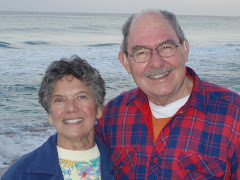Last week we moved on from Lander, Wyoming on down to Fort Bridger, Wyoming and eventually to Hatch, Utah. This trip took us up over South Pass, the point where many pioneers passed over the continental divide.
South Pass, although at respectable elevation, (7550 feet), is actually a fairly flat, high plateau -- treeless, and wind swept. Pioneer travelers had to leave the Sweetwater River and make what hopefully would be quick trip to the Big Sandy River. Many of the pioneers opted to take a short-cut, the Sublette Cutoff, a shortcut taken to reduce to time to get to Oregon, but chancy -- requiring 50 miles without water -- meaning it was necessary to carry sufficient water for oneself, and livestock, and to not getting lost. Death or at least loss of all possessions could and did happen. The short cut was taken to save time. The pioneers were anxious to cross the mountains to Oregon before winter set in.
Other hardships occurred on the Mormon Trail. Many of the Mormon pioneers, -- some of them immigrants from Europe, would pack all their possessions in two wheeled carts and pull these carts all the way to Salt Lake City. On several occasions pioneer Mormons got trapped in bad weather, and were rescued by earlier settlers form Salt Lake City.
Enormous numbers of Americans emigrated west in the 1800’s on the Oregon, Mormon and California trail. In fact the Western states were all settled by immigrants, many of them traveling under extremely dangerous circumstances. Many died. At South Pass and Fort Bridger, places now nearly deserted, were once the site of many people passing to new homes.
We need to remember we are a nation of immigrants, who have largely displaced the Native Americans, the original inhabitants. This should give us pause when we see today, when we see people who in very dangerous circumstance come to our country seeking an opportunity for a better life, much as were those who passing through South Pass and Fort Bridger, less than a hundred years ago.
Subscribe to:
Post Comments (Atom)

No comments:
Post a Comment